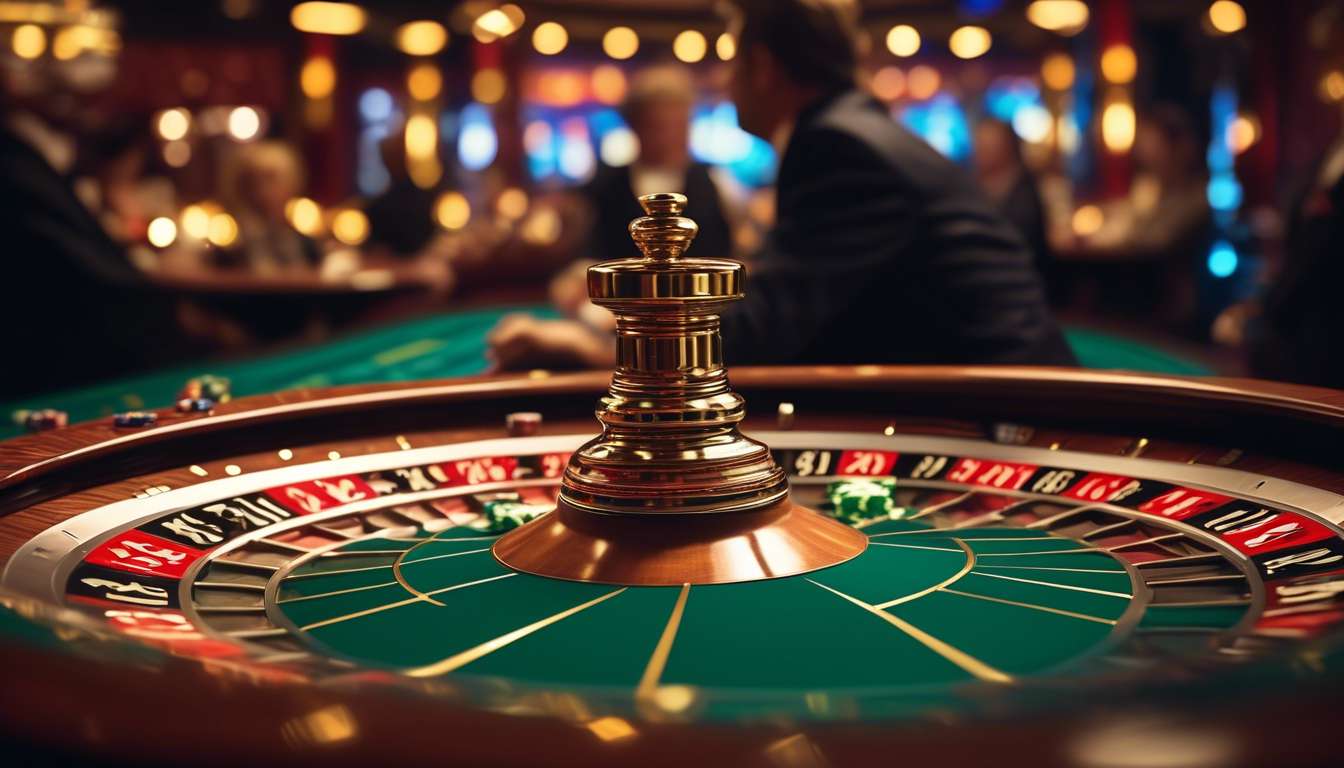In the vibrant world of poker, where every hand is a blend of strategy and chance, we find ourselves drawn to the thrill of the game and the pursuit of mastery. As players, we know that poker is not just about luck but involves a deep understanding of human behavior, mathematics, and risk management. Together, we embark on a journey to refine our skills and elevate our game to new heights.
In this article, we will explore essential tips and strategies that can transform how we approach each game, from reading our opponents to managing our bankroll effectively. Whether we are seasoned players or eager novices, there’s always room to grow and learn.
By sharing insights and experiences, we aim to cultivate a winning mindset and a strategic approach that will help us navigate the unpredictable waters of poker with confidence and precision.
Let’s delve into the art of poker and discover the keys to success.
Understanding Poker Hands
Understanding poker hands is crucial for making informed decisions and building confidence at the table. To excel in poker, every player must master the hierarchy of hands, which serves as the foundation for all strategies and gameplay.
Here are the essential poker hands, ranked from highest to lowest:
-
Royal Flush
- This is the highest possible hand in poker.
- It consists of the ace, king, queen, jack, and ten, all in the same suit.
-
Straight Flush
- Any five consecutive cards of the same suit.
- It ranks just below a Royal Flush.
-
Four of a Kind
- Four cards of the same rank.
- The fifth card, known as the kicker, can be any card.
-
Full House
- A combination of three cards of one rank and two cards of another rank.
- Often described as “three of a kind plus a pair.”
-
Flush
- Any five cards of the same suit, not in sequence.
- The highest card in the flush determines its rank.
-
Straight
- Five consecutive cards in any suit.
- The ace can be used as either the highest or lowest card.
Mastering these poker hands not only boosts your confidence but also helps you feel more connected and strategic at the table. By familiarizing yourself with these hands, you lay a strong foundation for becoming a skilled poker player.
Reading Your Opponents
Successfully reading your opponents is a vital skill that can significantly enhance our decision-making and overall strategy at the poker table. By observing subtle cues, we can gain insight into their intentions and predict their next moves.
It’s not just about watching their hands; we need to pay attention to:
- Their body language
- Betting patterns
- Reactions when the cards are dealt
In poker, every player has a tell, and our job is to uncover it. Whether it’s a nervous twitch or a sudden change in betting style, these signs can guide us in making informed decisions.
We should also be mindful of our table image; understanding how others perceive us can be just as important as reading them.
By fostering a keen sense of awareness and engaging with our opponents, we create a shared experience at the table. Together, we can elevate our game and truly belong in the world of poker.
Bankroll Management Strategies
Effectively managing our bankroll is crucial for sustaining long-term success and minimizing risks at the poker table. As members of the poker community, we recognize that our bankroll isn’t just money; it’s the lifeline that keeps us in the game, empowering us to play confidently and strategically.
Key Strategies for Bankroll Management:
-
Set Clear Limits:
- Define how much you’re willing to risk in a session.
- Maintain control and prevent emotional decisions that could undermine your efforts.
-
Play Within Your Means:
- Select tables and stakes that align with your bankroll size.
- Avoid overextending yourself to prevent unnecessary stress and financial strain.
Remember, poker is a marathon, not a sprint. Maintaining a healthy bankroll allows us to handle the inevitable ups and downs gracefully.
Commitment to Disciplined Bankroll Management:
- Together, let’s commit to disciplined bankroll management to ensure our continued growth and enjoyment in the poker community.
- We’re all in this together, aiming for sustainable success.
Bluffing Techniques
Mastering bluffing techniques is essential for keeping opponents on their toes and enhancing our overall strategic play. In poker, creating a sense of unpredictability is crucial. By perfecting our bluffing, we not only keep our opponents guessing but also build a sense of camaraderie among us as skilled players.
Bluffing isn’t just about deceiving; it’s about:
- Reading the room
- Gauging our opponents’ tendencies
- Timing our moves impeccably
When we decide to bluff, we’re making a calculated risk, adding layers to our game. Key considerations include:
- Our table image—are we perceived as tight or loose players? This perception can guide us in choosing when and how to bluff.
- Observing opponents’ reactions, which can reveal their weaknesses and provide the perfect opportunity to pull off a successful bluff.
In our poker community, mastering the art of bluffing not only elevates our game but also strengthens the bond we share as we outwit and outplay together.
Positional Awareness
Understanding positional awareness allows us to make more informed decisions and capitalize on the flow of the game.
In poker, the order in which we act can significantly affect our strategy and success. By recognizing whether we’re in early, middle, or late position, we can adjust our play accordingly.
-
Early Position: Requires caution, as we have less information about our opponents’ intentions. Playing tight is often the best move.
-
Middle Position: We gain a bit more insight, allowing us to loosen up slightly while still being mindful of players yet to act.
-
Late Position: Truly where we gain an edge. Acting after most of our opponents lets us make decisions with more information, giving us a chance to bluff or bet more aggressively.
Together, by paying attention to our position, we strengthen our bond as a team, building camaraderie and enhancing our collective poker experience.
Let’s embrace this advantage at the table!
Odds and Probabilities
Understanding the odds and probabilities in poker gives us a strategic advantage, enabling us to make calculated decisions based on the likelihood of different outcomes. By mastering these concepts, we’re not just playing the game; we’re becoming part of a knowledgeable community that thrives on skillful decision-making.
Calculating pot odds helps us determine whether to:
- Call
- Fold
- Raise
This ensures we’re making choices that align with our long-term strategy.
When we’re at the table, knowing the probability of improving our hand by the next card is crucial. It connects us with fellow players who’ve honed their skills, creating a shared understanding of the game’s nuances. For instance, if we’re holding a flush draw, understanding the odds of hitting our draw on the turn or river can be the difference between winning and losing.
Together, we can elevate our poker game by embracing the mathematical backbone of poker, fostering a sense of belonging in this strategic endeavor. Let’s continue enhancing our skills and connecting with others who share our passion.
Mental Game Mastery
Mastering Poker: The Mental Game
In our quest to master poker, honing our mental resilience and emotional discipline is just as crucial as understanding the odds. We need to train our minds to stay calm under pressure, ensuring our emotions don’t dictate our decisions at the table. Mastering this mental game connects us with the poker community, where we all strive for the same goal: consistent success.
Emotional Control
Poker can be an emotional rollercoaster. It’s easy to get caught up in the highs of winning or the lows of a bad beat. Yet, we must remain composed and focused. When we control our emotions, we avoid the pitfalls of tilt, allowing us to make rational decisions regardless of the hand or situation.
Path to Mental Mastery
By practicing mindfulness and patience, we forge a path to mental mastery. Together, as we navigate the complex world of poker, sharpening our mental game ensures we’re not just players, but true masters of the art.
Key Practices for Mental Mastery
- Cultivate mindfulness to enhance focus and awareness.
- Develop patience to maintain composure during long sessions.
- Engage with the poker community to share strategies and experiences.
By integrating these practices, we strengthen our mental game, paving the way for success at the poker table.
Continuously Learning and Adapting
In our journey to becoming adept poker players, constantly learning new strategies and adapting to evolving game dynamics is essential for maintaining an edge. Poker is a game that’s never static; it requires us to stay on our toes and embrace continuous growth.
Our poker community thrives on shared knowledge, making us stronger together. By actively engaging in discussions, analyzing hands, and studying new techniques, we enhance our skills and fortify our bonds with fellow players.
We can’t underestimate the power of observing others. Watching seasoned players can reveal insights into their strategies and decision-making processes.
Embrace the ever-changing landscape of poker by staying current with trends and adjusting our playstyle accordingly. This adaptability not only sharpens our game but also helps us connect with like-minded individuals who share our passion.
Let’s commit to this collective pursuit of excellence:
- Actively engage in discussions.
- Analyze hands regularly.
- Study new techniques.
- Observe seasoned players.
- Stay current with poker trends.
- Adjust playstyle as needed.
As we learn and adapt, we become part of a thriving poker community, united by our shared quest for mastery.
What are the most common mistakes beginners make when starting to play poker?
When we started playing poker, many of us fell into the same traps. Beginners often make mistakes such as:
- Overvaluing weak hands
- Not paying attention to their opponents’ patterns
- Failing to manage their bankroll wisely
By learning from these errors, we grew as players.
It’s essential to be patient, observe the game, and understand the importance of strategy.
With practice and dedication, we improved our skills and became more successful at the poker table.
How can I improve my decision-making speed during a poker game?
To improve our decision-making speed during a poker game, we focus on staying alert and attentive to the game.
Strategies for Improvement:
-
Regular Practice: By practicing regularly and studying different scenarios, we can train our minds to make quicker and more accurate decisions.
-
Trust Instincts: It’s important to trust our instincts while also considering the odds and our opponents’ behaviors.
Benefits of Dedication and Experience:
With dedication and experience, we can enhance our ability to make swift and strategic choices at the poker table.
What role does physical fitness play in maintaining focus and stamina during long poker sessions?
Staying physically fit is key to keeping our focus sharp and stamina high during marathon poker sessions.
Benefits of Regular Exercise:
- Maintains mental alertness
- Enhances endurance
- Aids in making quick decisions at the table
When we take care of our bodies, we’re better equipped to handle the mental demands of the game.
So, let’s hit the gym and ensure we’re in top form for our next poker showdown!
Conclusion
Congratulations on completing this crash course in poker mastery! By mastering various essential skills, you are well on your way to success at the poker table.
Key Areas of Mastery:
-
Understanding Poker Hands: Learn the hierarchy of poker hands to make informed decisions during the game.
-
Reading Opponents: Develop the ability to interpret opponents’ behaviors and betting patterns.
-
Managing Your Bankroll: Implement strategies to effectively manage and preserve your poker funds.
-
Utilizing Bluffing Techniques: Use bluffing strategically to keep opponents guessing and gain an advantage.
-
Being Aware of Positional Advantages: Recognize the importance of your seating position relative to others at the table.
-
Understanding Odds and Probabilities: Calculate odds to make mathematically sound decisions.
-
Mastering the Mental Game: Maintain focus, discipline, and emotional control during play.
-
Continuously Learning and Adapting: Stay informed about new strategies and adjust your play style as needed.
Keep practicing and stay focused. Remember that success in poker is a combination of skill, strategy, and a little bit of luck. Go out there and crush the competition!




